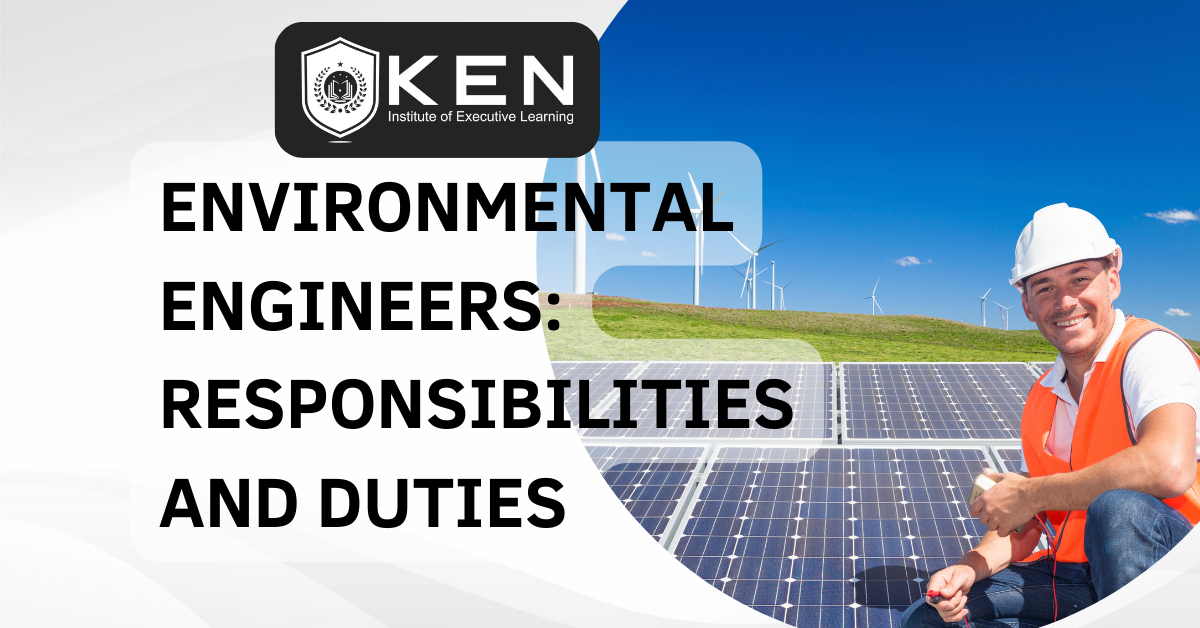
There are many reasons why an “Environmental Engineer” needs to be responsible. The responsible engineers follow the codes of ethics to avoid unnecessary problems. The problems majorly occur in two different ways. One of them is when you can assess and the other is when you cannot. A mistake made by an Environmental Engineer may result in huge losses to the ecosystems. An engineer is supposed to assess the risks of the disasters that may occur at times, though enough care is taken. Knowing all the possibilities, if an engineer neglects the responsibilities and duties of environment safety, the results can be disastrous.
Environmental engineers study the effect of technological advances on the environment, addressing local and worldwide environmental issues such as:
- acid rain
- global warming
- ozone depletion
- water pollution
- Air pollution from automobile exhausts and industrial sources.
Environmental Engineers’ Responsibilities:
- to devise solutions for:
- wastewater management
- water and air pollution control
- recycling
- waste disposal
- public health

- to design:
- municipal water supply systems
- industrial wastewater treatment systems
- plans to prevent waterborne diseases
- improve sanitation in urban, rural, and recreational areas
- Provide system and component design that reduce negative impact on the environment
- to evaluate:
- hazardous-waste management systems
- the severity of health and environmental hazards
- the environmental impact of proposed construction projects
- Conduct research and technical audits on the environmental impact of the project, analyze data, and perform quality control checks
- Monitor progress and provide recommendations reports
- Document and maintain plans, requirements, protocols, permits, and standard operating procedures
- to advise on:
- treatment
- containment
- systems technical evaluation
- Achieving quality, sales, revenue, and profitability goals
- to develop:
- regulations to prevent mishaps
- resources management schemes
- Integrate the latest technologies into systems
- Collaboration with scientists, planners, and experts
- to implement:
- environmental engineering law
- Jurisdictions about the safety of the environment and ecosystems
- impose licensing and registration requirements
- Serve as a technical advisor on environmental policies and standards to ensure regulatory applicability
To comply with all these responsibilities, Environmental Engineers use the principles of engineering, soil science, biology, and chemistry to develop solutions to environmental problems. They work to improve recycling, waste disposal, public health, and water and air pollution control. They also address global issues, such as unsafe drinking water, climate change, and environmental sustainability.
Duties of an Environmental Engineer
- Prepare, review, and update environmental investigation reports
- Design projects that lead to environmental protection, such as water reclamation facilities or air pollution control systems
- Obtain, update, and maintain plans, permits, and standard operating procedures
- Provide technical support for environmental remediation projects and legal actions
- Analyze scientific data and do quality-control checks
- Monitor the progress of environmental improvement programs
- Inspect industrial and municipal facilities and programs to ensure compliance with environmental regulations
- Advise corporations and government agencies about procedures for cleaning up contaminated sites
- Conduct hazardous-waste management studies for evaluation of the significance of a hazard and advice on treating and containing it.
- Design systems for municipal and industrial water supplies and industrial wastewater treatment, and research the environmental impact of proposed construction projects.
- Environmental engineers in government develop regulations to prevent mishaps

To fulfill their duties, Environmental engineers apply scientific and engineering principles to evaluate if there are likely to be any adverse impacts on water quality, air quality, habitat quality, flora and fauna, agricultural capacity, traffic, ecology, and noise.
If impacts are expected, they then develop mitigation measures to limit or prevent such impacts.
Basic Requirements and Skills
To carry out the responsibilities and duties, the basic requirements and skills, that an Environmental Engineer should possess:
- Proven working experience as an Environmental Engineer
- Hands-on experience with analytical, mechanical, and compliance software (e.g. SAS, Autocad, etc)
- Ability to think on a large and small scale
- Familiarity with quality assurance, documentation, environmental rules, regulations, and best practices
- Project and personnel management skills
- Current professional engineer license
- Advanced MS Office skills
Some Environmental Engineers themselves specialize in ways to minimize the effects of acid rain, climate change, automobile emissions, and ozone depletion. They also collaborate with environmental scientists, urban and regional planners, hazardous-waste technicians, and other engineers, as well as with specialists such as experts in law and business, to address environmental problems and environmental sustainability.
In the USA, the practice of environmental hazards assessment was formally initiated on January 1, 1970, the effective date of the National Environmental Policy Act (NEPA).

Since that time, more than 100 developing and developed nations either have planned specific analogous laws or have adopted procedures used elsewhere with the collaboration of responsible Environmental Engineers.
For top-level Environmental safety courses, more advice on “How to Save Our Planet” or any personalized information get in touch with us
At: info@keneducation.in, or
visit our website www.keneducation.in or
call us on +917569034271
Let’s connect on Facebook, YouTube, LinkedIn, and Instagram.
Tag: Health & Safety

